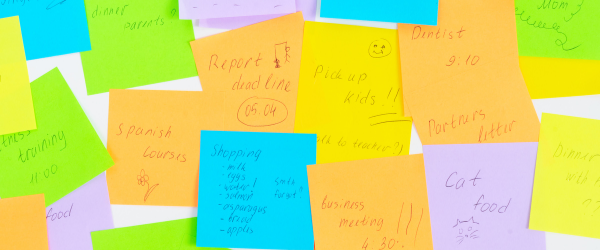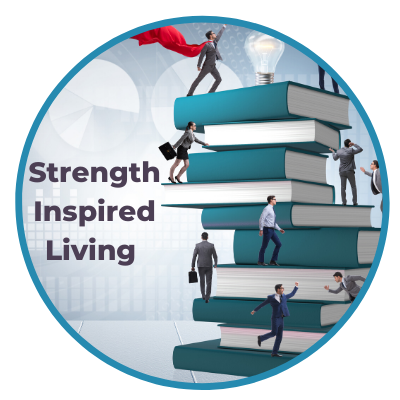|
April 12, 2022

Executive Function: Working Memory
In the February newsletter, we introduced our theme for 2022 on Executive Functioning which is a really important theme for those with ADHD to understand. So let’s recap exactly what Executive Functions are.
There are many thought leaders in the ADHD world who discuss Executive Functioning. For this newsletter, I am going to defer to Richard Guare, Ph.D., and Peg Dawson, EdD’s definition.
|
Executive Skills are the “brain-based skills required for humans to effectively execute, or perform, tasks and solve problems. We all need these to plan and direct activities, regulate behavior, and make efficient and effective use of our intelligence.”
|
This month’s newsletter will be a deeper dive into the EF skill of Working Memory. Working memory as defined by Harvard University is “our ability to retain and manipulate distinct pieces of information over short periods of time.” The metaphor of the air traffic control system at a busy airport is perfect for encapsulating the importance of working memory. Imagine how busy the air traffic controllers are trying to manage the arrivals and departures of multiple planes on various runways and how quickly they have to switch gears due to weather conditions, miscommunications, or emergency situations.
Working memory is a small amount of information that is held in mind to execute cognitive tasks in contrast to our vast long-term memory which stores lots of information over one’s life. Working memory is a short-term system to manipulate information needed at the moment. The capacity is limited and therefore when overloaded much of that information can be lost.
Individuals with ADHD often have problems associated with working memory capacity to store information. Add attentional control issues along with working memory issues and it is easy to see how difficulties with being successful manifest. Here are a few examples of working memory difficulties for people with ADHD of all ages and stages.
Working memory helps children and teens hold on to information long enough to use it. Deficits in working memory can cause children to experience information overload while engaging in learning activities. The result can show up in behavior issues or even shutting down emotionally. So it is easy to see how working memory has a significant impact on social realms, academic performance, and cognitive efficiency.
Examples of the impact of working memory weaknesses in Children and Teens:
- Forgetting to hand in homework
- Doing mental math
- Losing materials
- Forgetting to check the assignment book or note when assignments are due
- Trouble remembering multiple problem steps or directions
Potential solutions to improve working memory:
- Create smaller bits of the information and chunk down tasks or projects to help them remember.
- Modify the physical or social environment to reduce the load on working memory. Use visual cues, planners, and timers to bring potential things back into the Now.
- The use of sticky notes and highlighters can be very useful to keep the information at top of mind long enough to be used.
- Not only writing down the tasks or steps but also the adult saying them out loud and then having the child repeat what was said can be helpful to strengthen their memory.
Working memory allows us to keep track of priorities while trying to block distractions, both internal and external that can take us off track. This type of memory is also important for everyday decision-making and reasoning. This memory we use on a daily basis can be affected by sleep quality, our emotions, and age.
Examples of the impact of working memory weaknesses in Adults:
- Misplacing or losing items
- Difficulty following multi-step directions or having to re-read the text
- The stress of daily chores like running errands
- Learning someone’s name and then keeping it in memory while having a conversation
- Losing what you wanted to say in a conversation
- Keeping a person’s address in mind while being given directions
Potential solutions to improve working memory for Adults
- Recognize triggers and have plans in place to take preventative steps. Using the art of reengineering your environment to add visual cues will reduce the load on working memory.
- Have a “home” location for items like keys, glasses, and phones. Pick out items needed for the next day and have them ready ahead of time.
- Make use of strategies to outsource those working memory aids such as planners, timers, notes, and lists. Visualize and rehearse real-life situations and what series of actions you would use. Create a template of those steps if that situation will happen often so you don’t have to recreate the wheel every time.
- Investigate stressors and plan how you can dial them down or eliminate them altogether. Is noise a problem for you when trying to focus? Then strategize what you can have ready like noise-canceling headphones or earplugs. What areas of your home or work are the most noise-free? The less you are taxing your system with any sensitivities, the more energy you will have to give to working memory.
In conclusion, since working memory plays an important role in concentration and in following instructions or getting things done, it is the underpinning of academic achievement, productivity, goal achievement, and general satisfaction with our performance in so many areas of life.
Your working memory is a valuable asset that you should protect and develop even if you no longer are in the academic realm. The ability to remember quickly and accurately is always important. Fortunately, we have an incredible process called neuroplasticity that allows the brain to rewire itself and modify or create neural connections. And because of the human brain’s plasticity and enormous capacity for learning, it is possible to improve the executive functions of those with ADHD through strategies and support. That’s good news for us all!

Katherine Jahnke
ADHD Coach | Center For Living Well with ADHD, LLC
More about Katherine
Join Our Next Masterclass

Motivation and Mindset with ADHD
Saturday, April 16, 2022
11:00 am Eastern | 10:00 am Central | 9:00 am Mountain | 8:00 am Pacific
"I know what I need to do, I just have a hard time getting to it!" Sound familiar? There could be many reasons someone avoids taking action on the obvious or making big changes in their life.
Learn how motivation and mindset are two important factors to reckon with to get more accomplished. In this class, we explore how to leverage your own motivators and shift your mindset to help you get and stay in action.
Read more about this masterclass…
Small-Group Coaching begins this week!

Great for newly diagnosed or those just getting started with addressing the challenges that arise day to day in their personal and professional lives. This 30+ group combines foundational learnings about living well with ADHD plus coaching and support to create better experiences and work on individual goals.
- Small-Group meets three Thursdays of each month
- April 14th - June 22nd, 2022
- Sessions begin at 6:30 pm ET | 5:30 pm CT | 4:30 pm MT | 3:30 pm PT
- A few openings remain. Is one of them for you?
Read more about this group coaching program
Cool Resource
 If you are like me, finding great tech gurus who can relay information in a concise and entertaining fashion is imperative. At the rate technology is changing and updating there is no way I have the bandwidth to keep up. One of my favorite trainers is Steve Dotto of Dottotech. I watched his video on Google maps which is an extremely useful tool in my everyday life. If you are like me, finding great tech gurus who can relay information in a concise and entertaining fashion is imperative. At the rate technology is changing and updating there is no way I have the bandwidth to keep up. One of my favorite trainers is Steve Dotto of Dottotech. I watched his video on Google maps which is an extremely useful tool in my everyday life.
In this training, he gives you tips and tricks in Google Maps beyond just the turn-by-turn directions we mostly use it for. He shows how you can measure distance, measure areas, look back in time with street view history, how to integrate Maps with Google Calendar and Gmail, and how you can share your location with family and friends using locations.
And he gives you all this Google Maps goodness in 16 minutes. Hope you find this information as useful and fascinating as I did. Here’s the link to his video on YouTube.
Meet Our Team

Learn More About Our Coaches & Schedule a Complimentary Get Acquainted Session
©2021 Center for Living Well with ADHD · All Rights Reserved
Visit Our Website
|